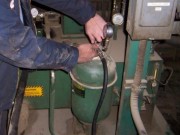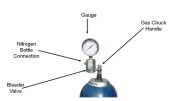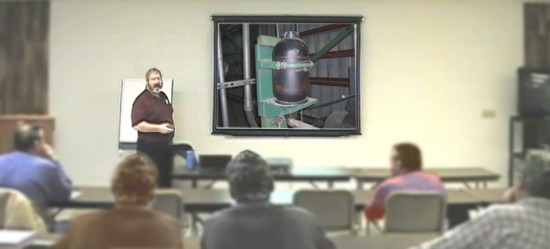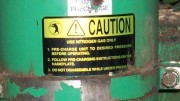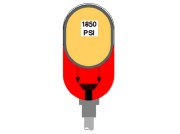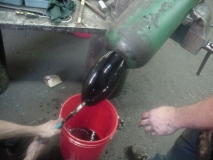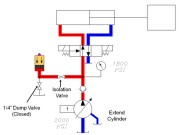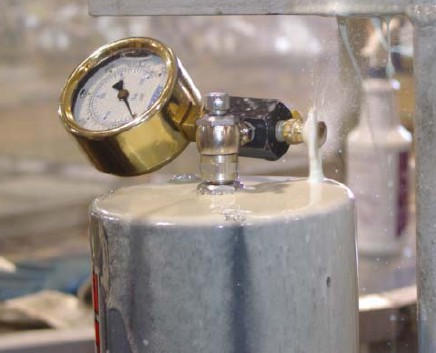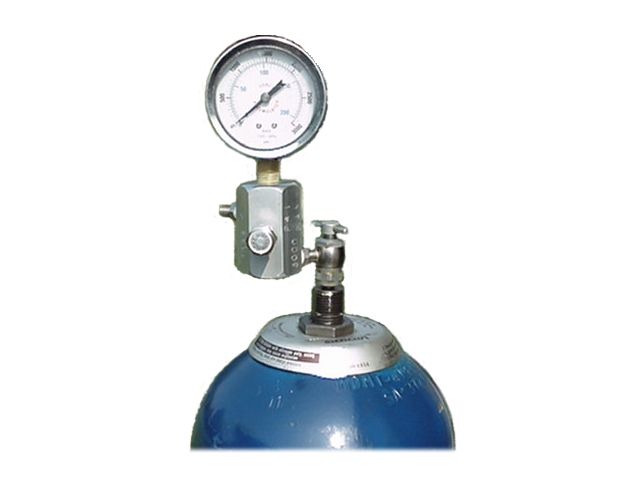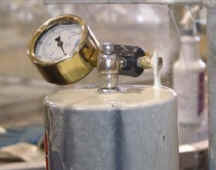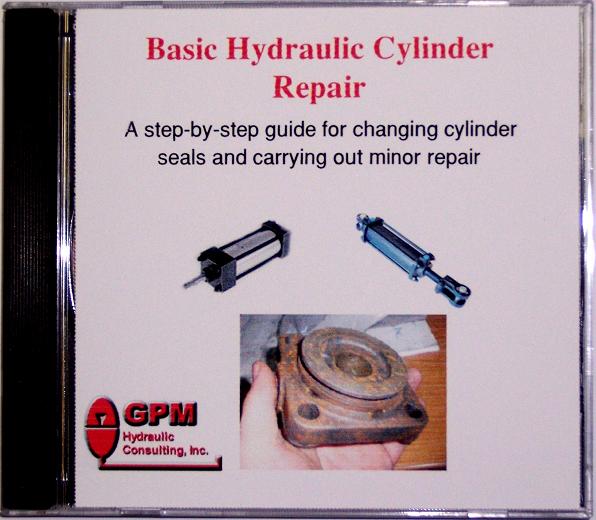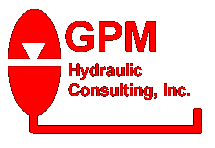
P.O. Box 1376
Monroe, GA 30656
(770) 267-3787 gpm@gpmhydraulic.com
For an archive of past newsletters, please visit:
http://www.GPMHydraulic.com/newsletter_archive/
CLICK HERE to send this newsletter to a friend!
|
'Troubleshooting Hydraulics' Newsletter |
||||
|
||||
|
Still time to sign up for the Conyers, GA Maintenance Basic Hydraulic Troubleshooting Workshop May 19th - 21st! Call Now! In This Issue |
||||
| 1.
GPM Exclusive Webinars! Scheduled for May 2. Do Minor Oil Leaks Really Matter? 3. What You Don't Know About Hydraulic Accumulators Can KILL You! ***NEW!*** Accumulator Safety DVD 4. The Machine is Fixed! But Why Did it Break in the First Place? 5. Call GPM for Emergency Hydraulic Troubleshooting 6. 2009 Public Maintenance Hydraulic Troubleshooting Workshop Schedule 7. 2009 One-Day Troubleshooting Hydraulic Pumps and Accumulators Workshop Schedule |
May 29th
 By Jack Weeks
By Jack Weeks
We are often asked if minor leaks are really much of a concern. Repairing them takes valuable time that most maintenance shops feel should be devoted to issues that could halt production. Everyone knows that a ruptured hose needs to be addressed right away. But the mistaken belief that a minor leak doesn't cause a problem is certainly not uncommon. It is even a little surprising how many people seem to believe that hydraulic machines are "supposed to leak a little". We have heard everything from "The oil that bypasses the cylinder seals helps to keep the rods lubricated" to "The leaks in our system help keep our oil fresh since we have to replace so much of it all the time". These same people however would be dissatisfied if their automobile's power steering pump, automatic transmission or brake lines "leaked a little bit".
So how much does a minor leak cost? To answer that question, we have to first explore all of the costs involved. Most people think that the only cost is the amount of oil that has to be unnecessarily replaced. But this is not the only cost associated with hydraulic leaks. The actual costs include:
-
Replacement Oil
-
Safety
-
Environmental Concerns
-
Cleanup Costs
-
Disposal
-
Contamination
-
Loss of Machine Efficiency
Replacement Oil
This is the most obvious cost. A drop of hydraulic oil doesn't cost very much even at today's prices. But if your machine loses a drop of oil every second, it adds up. A drop every second will equal about one gallon per day. 30 gallons per month and 365 gallons per year. Depending on your geographic area, the type of oil you use in your machine and the volume you purchase you pay between $6 and $10 per gallon. This means that a leak that loses one drop per second (most machines lose many times that) is costing you between $2190.00 and $3650.00 each year in replacement oil alone.
Safety
The cost of replacement oil is bad enough but oil leaks pose a safety hazard in almost every facility we have visited. The cost of safety hazards is hard to calculate. But even one incident can cost a few hundred dollars or a few million.
Environmental Concerns
Not everyone agrees with the Environmental Protection Agency's standards and policies. But we doubt anyone believes that EPA requirements will become more lenient in the near future. If any changes are made in EPA standards, they are likely to include stricter controls and heavier fines and penalties. Currently an uncontained spill of more than one gallon can require EPA notification. Fines in the millions of dollars are not uncommon.
Cleanup Costs
Often the costs of routine cleanup are ignored, but that doesn't make them go away. Time devoted to cleaning up from a leak is time that could be spent on more productive endeavors and could result in overtime costs that would otherwise not have to be incurred. And we cannot ignore the cost of cleanup equipment, absorbent pads and detergents. Annual cleanup costs can easily add $2000 or more to our drop-per-second leak.
Disposal
Those of us who can remember a time when waste oil companies paid for the privilege of coming to empty our waste hydraulic oil tanks can probably also remember getting change back from a five dollar bill after having someone else fill up our gas tanks, check our oil, check our tire pressure and clean our windshield. These days an environmentally acceptable means of disposing of waste oil can cost $3 per gallon or more. There's another $1100 annual cost to our minor leak.
Contamination
It's easy to forget that if oil has a way out of the machine, contaminants have a way in. Airborne contaminants, particles and water all can wreak havoc with a hydraulic machine. Over 96% of all hydraulic failures can be directly traced to contaminants in the oil. Not all of those contaminants come from an oil leak of course, but any that we can stop will pay big dividends in parts that do not have to be changed unnecessarily, reduced down time and greater intervals between flushing or changing the oil.
Loss of Machine Efficiency
A machine that leaks is working harder than it has to. This means that, while the machine appears to be functioning as it should, our energy costs have increased. Suppose our one-drop-per-second leak causes the power bill to increase by five cents per day. That's another $18.25 in annual cost. Not a huge amount, but it could probably buy us dinner somewhere. And it adds up if it occurs in several machines.
So assuming that no one gets hurt from slipping on oil and the EPA doesn't have to visit, each drop-per-second leak is costing somewhere between $5000 and $7000 every year. And hydraulic leaks, unlike paper cuts, do not heal. They gradually get worse. At some point, what starts as a "minor" leak can become a machine outage. No leak is so minor that it should be ignored.
|
One would expect, with a statistic like that, to find fluid maintenance to be of the highest priority in all industrial facilities. Would anyone care to guess what we usually find to be the most largely ignored facet of proactive maintenance? You guessed it - fluid maintenance! Why would that be, do you suppose?
There are probably a lot of reasons, but we are willing to bet that near the top of the list is the perception of the primary function of a maintenance crew. If asked, most managers will say that the function of the maintenance department is to restore machines to operation whenever they fail. Oh, and they also perform preventive maintenance to avoid outages. Almost every facility has some sort of fluid maintenance program in place. Some do better than others of course, but in all of our travels we have never found a facility that had NO room for improvement. And most places do tell us that there are plans for beefing up fluid maintenance but that right now there are more critical fires to put out. The trouble is, by the time one fire is put out, usually there is another one that keeps fluid maintenance on the back burner.
Everyone knows that the hydraulic oil is the lifeblood of the machine and that the condition of the fluid will also determine the condition of the machine and the longevity of its components. But not everyone knows the exact steps that can be taken to maintain the fluid and increase the machine reliability. Some people are not sure even where to start. This is where GPM Hydraulic Consulting can help. This month, we will be broadcasting our Fluid Maintenance webinar three times:
- Friday May 15th 10:00 AM EDT
- Friday May 22nd 1:00 PM EDT
- Friday May 29th 10:00 AM EDT
Be sure to attend one of them. Topics to be covered include:
- The 4 Functions of Hydraulic Fluid
- Viscosity
- The 4 Functions of the Hydraulic Reservoir
- Oil Coolers
- Contamination
- Fluid Sampling and Analysis
- Hydraulic System Flushing
- Filter Selection
- Filter Placement
- Leakage Control
At only $225 for one participant or a whole room full, this information-packed 90 minute webinar will pay for itself many times over. Call or email us today to register!
(770) 267-3787
GPM@GPMHydraulic.com
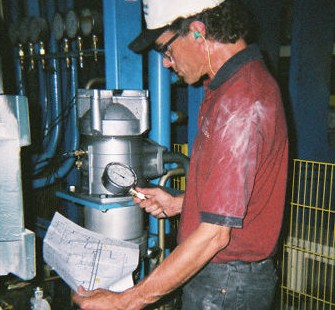
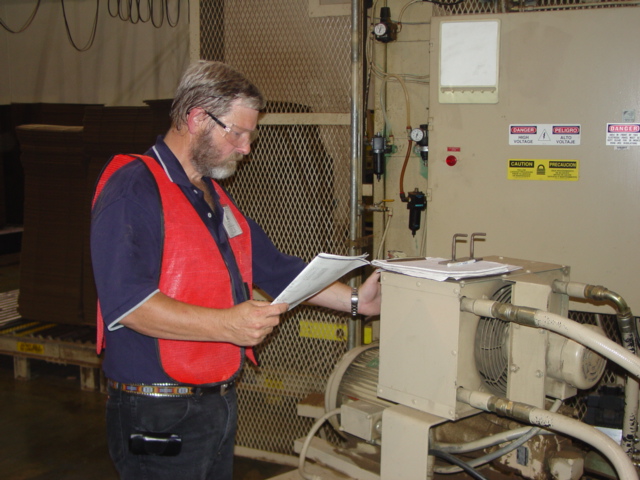
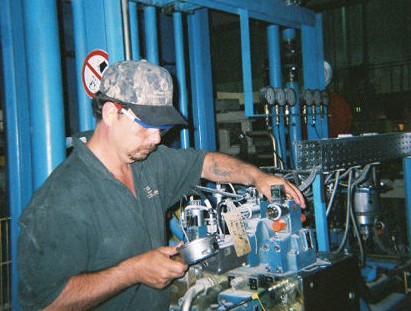
Nothing is more expensive than unscheduled down time. GPM’s customers know they can call whenever they have a troubleshooting issue they simply can’t resolve. With over 50 years experience dealing with hydraulic failures, our consultants have the resources to help troubleshoot whatever hydraulic problem you encounter. Whether you’re experiencing a total system outage, repeated component failure or just need a professionally designed preventive maintenance schedule, the consultants at GPM can help. Call GPM for
In-plant Troubleshooting
Leakage Problems
Pressure Settings
Shock Problems
Preventive
Maintenance Scheduling
Hydraulic Troubleshooting Manual Development
Startup
Consulting and Recommendations
Heat
Problems
Repeated
Component Failures
Speed Problems
Do you want to learn more about how GPM can help you? Go to http://gpmhydraulic.com/troubleshooting.htm

Maintenance Basic Hydraulic Troubleshooting
2009
3 Day Workshop
Registration
Fee Only $895.00 Per Person
Three
for the Price of TWO!
Every Third Registrant Attends for FREE!
Early Registration -
$845.00 For Confirmed Reservations
Booked 21 Days Prior to the Start of the Workshop
Call (770) 267-3787 To Register
Learn More About Our Maintenance Basic Hydraulic Troubleshooting Course
2009 Maintenance Basic Hydraulic Troubleshooting Schedule
Date
(Our mobile lab will not be available for this program - display pumps and valves will be used for learning purposes)
*Don't see your city listed? Call If You Would Like To See A Workshop Scheduled In Your Area!
(770) 267-3787
|
|
||||||||
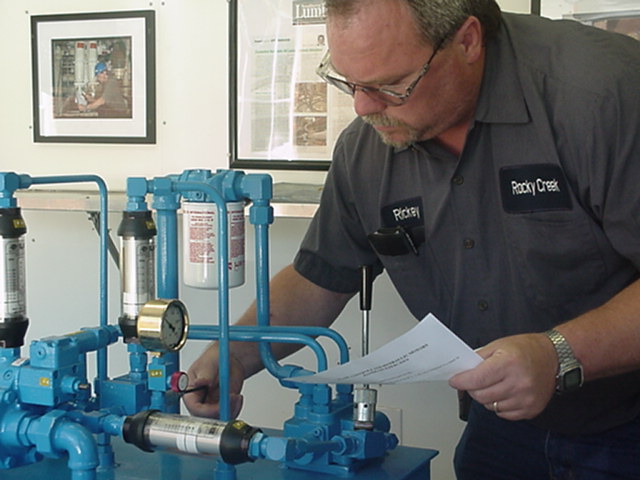
|
Hydraulic pumps and accumulators are the two components that determine how fast your machine operates. When a hydraulic problem occurs the pump is usually the first component that is changed. Since it is usually the most expensive and time consuming part to change out, it should NEVER be changed unless specific checks are made to verify that the pump is bad. The accumulator is the most dangerous hydraulic device. Prior to working on or around the machine you MUST verify that the pressurized fluid in the accumulator is at 0 PSI. Failure to do this can result in injury or death! What You Will Learn in This Hands On Workshop
Call, fax or email today to register for
this money saving and safety awareness enhancing workshop!
(770) 267-3787 Phone (770) 267-3786 Fax gpm@gpmhydraulic.com Registration Fee - $295
|
|||||||
If you've found our newsletter informative and beneficial please click here to tell your co-workers and friends.
A step-by-step guide for changing cylinder seals and carrying out minor repair. The manual contains disassembly, inspection of parts, minor repair, assembly, examples of seal failures and their causes, hydraulic cylinder speeds, metric/inch conversion table, fluid power formulas, rod and piston groove diameters.
$24.99 + Shipping & Handling
Site Index
[Home] [Our Training] [Hydraulic Consulting] [Safety Webinars] [System Flushing] [Our People] [Downloads and Multimedia] [Testimonials] [Hydraulics Quiz] [GPM Store] [Upcoming Events] [Contact Us]
GPM Hydraulic Consulting,
Inc.
Box 1376
Monroe, GA 30655
(770) 267-3787




